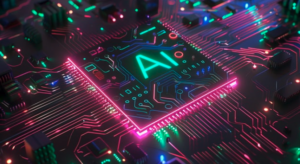“The speed and scale with which AI is developing requires investment in a strategic capability now…Through FASST, we will meet the mission needs of national security, energy security, and scientific discovery that will support sustained economic prosperity for the nation for decades to come.” – from the DOE website energy.gov

In some ways, AI seems to have come upon us rather quickly. But the Lab has been working with artificial intelligence and machine learning for a long time. In fact, the Lab Directed Research and Development (LDRD) program has funded machine learning projects as early as FY2010 (with funding to the Math Foundry, which was key in the research that led to CAMERA). The LDRD also funded the ML4Sci initiative in FY2016, and machine learning for multi-area projects has been a focus since FY22. These initiatives have laid a solid foundation for our AI capabilities.
“AI is rapidly transforming science across the Lab and elsewhere,” said Carol Burns, Deputy Lab Director for Research. “We are fortunate to have scientific user facilities, large-scale experiments, supercomputers, scientific, mathematical and computational expertise, AI-ready data, and partnerships that we can bring to bear, and we hope to contribute in a significant way to AI initiatives at the DOE national lab complex.”
The DOE has recently asserted the need for the U.S. to invest in AI innovation and in AI-powered research. On Jul 10, 2024 Senators Manchin and Murkowski introduced the“Department of Energy AI Act,” a program to develop and deploy Frontiers in Artificial Intelligence for Science, Security, and Technology (FASST). The Act authorizes $2.4 billion a year over five years, including the establishment of at least eight AI research centers that would work closely with industry and academia.
To explore opportunities and strategies for pursuing AI research and AI-powered research, the DOE’s Office of Science is holding AI roundtable discussions for national labs. To help prepare for these roundtables and to further explore Berkeley Lab’s core and unique strengths in this space, the Office of the Lab Deputy Director for Research has been working with ALDs and Lab AI experts to organize a series of webinars and a workshop to facilitate deeper discussions across the Lab on AI.
Delving into AI across the Lab
Since mid-August, a series of hourlong webinars are familiarizing the Lab community with existing tools, capabilities, and opportunities related to artificial intelligence and machine learning. The first webinar on August 15 featured a presentation by Jonathan Carter, Associate Lab Director for Computing Sciences, about the DOE’s new Frontiers in AI for Science, Security, and Technology (FASST) initiative, while at the second webinar on August 22, Carol Burns discussed the Lab’s goals for the AI webinar series and the upcoming Lab AI workshop. IT’s Adam Stone and NERSC’s Wahid Bhimji, presented during the following week, discussing the Lab’s compute infrastructure to support pioneering scientific AI research. Two more webinars focus on best practices for using AI in science. A webinar on September 12 focused on AI-ready data, featuring Sarah Richardson, an expert in AI-ready datasets and in integrating machine learning with microbial genomics. A webinar on September 19 about AI models for science will feature the Computing Sciences Area’s Ben Erichson and Marcus Noack.
AI@LBNL Workshop
The webinars lead to a two-day workshop at the Lab at which AI practitioners in domains related to our strategic research priorities will focus on identifying science challenges that AI can address and uncovering Berkeley Lab’s core strengths in scientific research, data science, and computing methodologies that position the Lab at the forefront of AI-driven discovery. The workshop will help synthesize content from the previous webinars while preparing the Lab to attend the Office of Science AI roundtables. Day one will focus on how AI can help create opportunities to conduct breakthrough science in each of the Lab’s science domains, while day two will focus on AI tools and applications for science across the Lab.
Preparing for the workshop
Researchers interested in attending the workshop attendees should fill out a form to describe the grand challenge they are considering and how AI/ML can radically advance solutions, why it is urgent to solve this problem now, the data that is readily available to address the challenge, and why the problem is a good fit for Berkeley Lab. Attendees will be thoughtfully selected by the AI@LBNL Steering Committee and ALDs to ensure diverse perspectives and expertise.
The AI Steering Committee is seeking documents that would provide useful background information for the workshop and the Office of Science roundtables. If you have any documents to share, please contact Linda Vu at lvu@lbl.gov.
“The future of AI is here,” said Carol. “Our hope is that the webinars and workshops will help us gain knowledge of LBNL’s AI-related activities and resources and our core and unique strengths, to prepare for the Office of Science roundtables this fall, and identify priority research opportunities as well as investments that we need to make. With the possibilities and opportunities that AI offers, it’s an exciting and dynamic time to be a scientist and to be at Berkeley Lab,” she continued.
***
For more information:
AI webinars and workshops at the Lab and a list of AI@LBNL Steering Committee members
Recorded AI webinars at the Lab
AI background links repository (DOE reports, Berkeley Lab reports, Berkeley Lab AI resources, other external reports. LDAP required for access)

